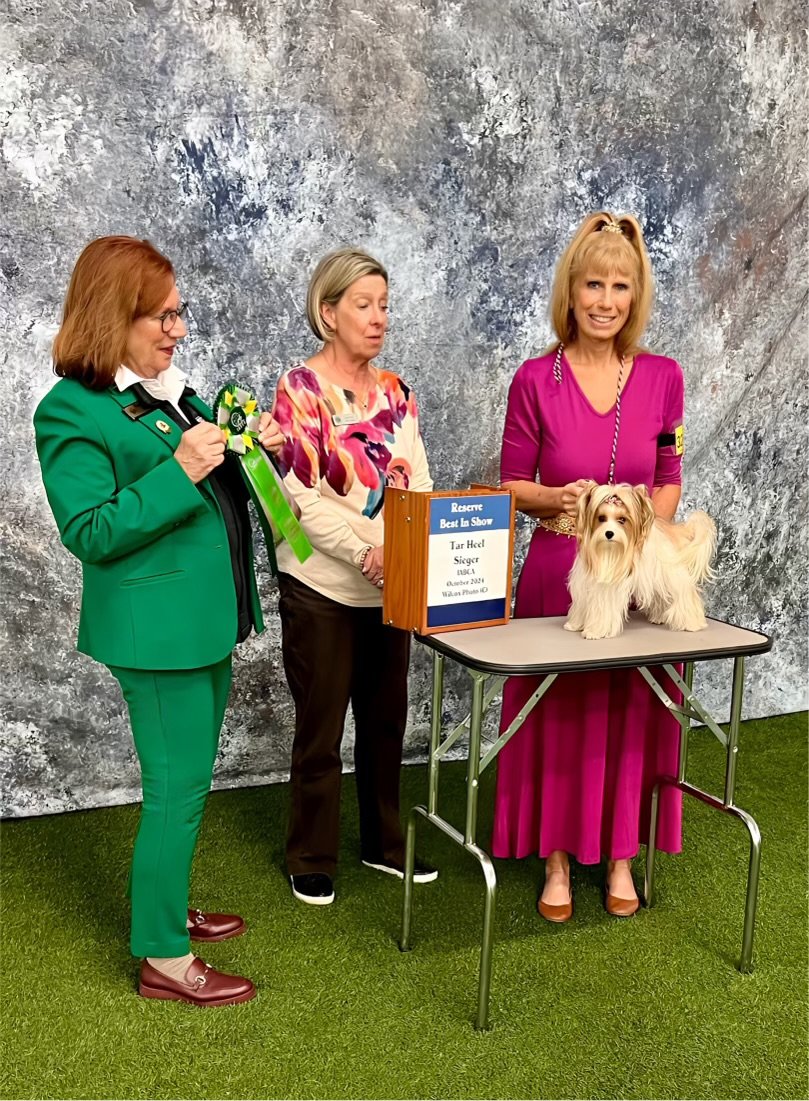First published Tuesday, Oct. 22, 2024 in the Dundalk Eagle.
Kimberly Ballantine’s whole life is Russian salon dogs.
It’s a rare dog breed all the way from the country that she and a few others across the country are working on introducing to the U.S.
Rare barely captures it, though — there are only 12 Russian salon dogs of breeding age across the U.S., she said.
Ballantine became interested in the dog breed after raising Yorkshire Terriers and Biewer Terriers for years. Her Biewers had been coming from Russia through a breeder.
“I had met this lady we’ve kind of talked back and forth through translator and she has been sending me a specific breed of Biewers out of certain lineages because you look all over the world for the correct lineages to match your dogs,” Ballantine said. “We became friends and I had seen them and said, ‘Hey, can you tell me more about them?’”
The Russian salon dogs are hard enough to get as it is, she said, but recent international turmoil threw a wrench into her plans to adopt more of the breed. First came the pandemic. Everything shut down.
When the pandemic ended, she thought she could get the dogs.
“The doors opened again and I said, “Now I’m going to be able to get my salons.”
But then Russia invaded all of Ukraine. Many Western countries, including the U.S., cut off ties with Russia in response. Things consumers take for granted like credit cards or Western Union money transfers were suddenly no longer available to send money to Russia.
That meant that Ballantine had to send cash with a Russian breeder based in Moscow who was on the list to get such a dog for two years. The breeder flew to Siberia to adopt a Russian salon dog, and managed to get the dog back to Ballantine by flying to Finland, then boarding a plane to Ireland, and finally boarding a plane to the U.S.
“It was a really big ordeal,” Ballantine, who is from Eastpoint but lives now in Essex with her husband George, said.
The ordeal is paying off, though: On Monday, she returned from a dog show in North Carolina where her Russian salon dog named Anastasia won the reserve best in show adult rare breed award, the equivalent of a second-place finish. The dog, who just turned 1, competed against 11 other adults. Anastasia also won best of breed, competing against seven other Russian salon dogs.
At a September competition in South Carolina, Petit Bijou’s Once Upon A December — Anastasia’s formal name — won best in show.
Besides the logistics of getting the dogs, there’s another factor Ballantine must deal with: Genetics. The dogs need to fit exact criteria in order to be successful at dog competitions, including having a straight back, straight ears, a curved tail, no substantial under- or overbite, shaped like an elongated square and many, many other factors.
That’s where genetics comes in: She needs to make sure each dog has exactly the correct traits — and no undesired recessive traits — and isn’t too closely related to any dog it breeds with. A database called Pedigree Dex helps her with that.
“You go to the world database and see, ‘Okay, this dog is related to that dog. No, we can’t do that, but this dog isn’t related,’” she said. “That way you can find unrelated dogs for your bloodline.”
It’s all a big responsibility, Ballantine says.
“I feel a deep sense of responsibility to make sure that these are healthy dogs and well bred dogs and structurally correct dogs,” she said. “Because if you start with junk, you’re going to breed junk. And I don’t want that.”


Leave a Reply